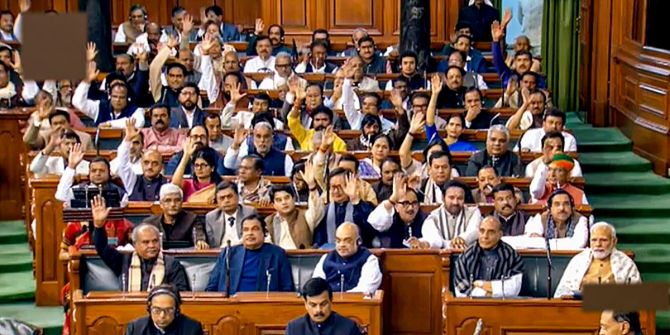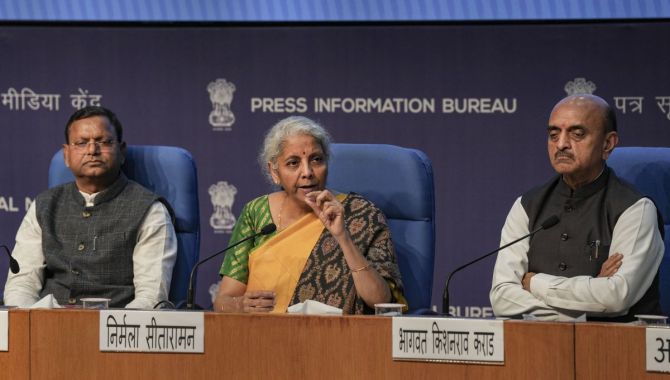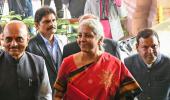'The BJP's real weapons are Hindutva, organisation and finance.'

"The government is making a huge public investment to strengthen the economy. It is a very fine measure and this is what governments should do, but also bear in mind that the government is making such a large investment because private investment is not forthcoming," Professor Prabhat Ghosh tells Rediff.com's Archana Masih while discussing the positives and negatives of the Union government's last full Budget before the 2024 general election.
Dr Ghosh, member secretary, Asian Development Research Institute, Patna, has conducted research in economics for 30 years, specialising in regional planning, rural development, evaluation of economic projects and large scale statistical surveys.
The positives, then the negatives:
There is a negative that lies in a positive. I'll tell you why. The government is making a huge public investment to strengthen the economy. It is a very fine measure and this is what governments should do, but also bear in mind that government is making such a large investment because private investment is not forthcoming.
In fact, Finance Minister Nirmala Sitharaman had appealed to private investors a few months ago to invest more.
The fact that private investors are not making enough investment is a bad sign. However, since the government is trying to compensate for the lack of private investment is a good sign.
It is a growth oriented Budget because of the substantial public investment which is bound to impact the growth process.
Positive 2: The growth rate of 6.8 per cent is very good considering what is happening in the rest of the world.
Sitharaman had promised more than 8 per cent growth in the last Budget which could not be achieved and that does not matter because 6.8 per cent is a very high figure and has to be seen as a positive.
Negative 2: Failure to contain fiscal deficit. There is always the problem of deficit in a Budget and containing this deficit is one of the most important duties of a finance minister.
Before the Covid pandemic, the fiscal deficit was around 4 per cent which went up to around 6.2 per cent because of Covid and we had to go for a deficit Budget. On one hand the FM is saying that our recovery is complete, yet the deficit has come down only to 5.8 per cent.

Some allurements of the last full Budget before the 2024 general election:
The 2024 Budget will be just 3-4 months before the general election.
Since this is the last full Budget -- a few so-called allurements were expected. In that aspect the government has given a good amount of money to tourism because it has implications for employment.
They have also allocated good amount of money for agriculture infrastructure, especially for warehousing and godowns.
The FM's argument is that many farmers have to sell their products just after harvest when the price is very low. But if the farmers are able to hold their crop for 2-3 months, then they might get a better price. Hence, the need for godowns to hold crop and that is why they have made provisions for investment in godowns/warehousing.
So far as the income tax reduction is concerned, those who are in the old tax regime will find there in no difference whatsoever; for that matter, the benefit for those in the new regime is also very marginal.
There has been no special effort to please the middle class.
There is no special relief for the middle class as such. A small portion of the middle class will be benefited.
Why the Opposition is attacking the government on the lowest-ever allocation to MNREGA
This government has been paying less attention to MNREGA right from the very beginning. If you ask them why it is less, they will answer that it is a demand-based programme. In case, there is demand for more payment it will have to be made, so budget allocation does not matter.
But that is not a convincing reply from the government. If you are giving less money to MNREGA that means you are weakening the programme.

But there has been substantial hike in allocation of funds to rural housing which will help the poor.
They are giving enough money because last year, their achievement in rural housing was much lower than what was targeted. They are putting more money this year so that there is better performance. This will benefit many poor people and will bring political dividends for the ruling government.
Agriculture, rural housing, tourism sector 00 all these will bring political dividends.
What about measures to boost employment?
If the tourism sector is expanded, it does have potential to generate employment. Tourism is service sector and hence is labour intensive.
But other than that, there is not much scope for job creation is other sectors.
Yes, they have put a lot of money in skill development. Skill development provides supply of skilled labour which does not mean that there is demand for skilled labour.
If there is unemployement in the market it is because there is no demand for labour. It is partly because a substantial part of labour is either unskilled or semi-skilled. If you spend money on skill development, you increase the quality of labour -- from non-skilled to semi-skilled, from semi-skilled to skilled, but this does not mean you are increasing the demand for labour which is more important.
Demand for labour comes from industry and is dependent on industrial growth.

The Budget scorecard
It is a 6/10, utmost 7/10 Budget.
Will it help the BJP in winning elections?
Marginally. The effect of the Budget on elections is very limited. The BJP's real weapons are Hindutva, organisation and finance.
Feature Presentation: Aslam Hunani/Rediff.com










